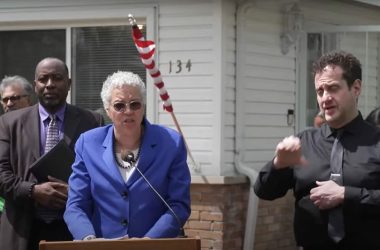Washington, DC–(ENEWSPF)–October 10, 2014.
Astronomical Prices of Some Cancer Drugs Hit Vulnerable Patients Hard
60 Minutes reported last Sunday on the high price of cancer drugs in the U.S. Lesley Stahl’s piece shed light on the fact that Medicare has to pay the price determined by the drug companies, since under current law, Medicare is prohibited from negotiating the prices. The report noted that some cancer patients have gone into bankruptcy in an effort to save their lives. Dr. Leonard Saltz, chief of gastrointestinal oncology at Memorial Sloan Kettering, noted that a patient could easily be paying $250,000 for two drugs, “just to get started.”
Dr. Hagop Kantarjian, chair of the department of leukemia at MD Anderson in Houston said, “This is unique to the United States. If you look anywhere in the world, there are negotiations. Either by the government or by different regulatory bodies to regulate the price of the drug. And this is why the prices are 50 percent to 80 percent lower anywhere in the world compared to the United States.” More at http://tinyurl.com/nmvy8y4.
“This is an outrage!” said Barbara J. Easterling, President of the Alliance. “People who have worked their whole lives are finding themselves at the mercy of insurance companies, right when they need their coverage the most!”
Americans United’s “Put the Middle Class First” Bus Tour Kicks Off
A bus tour promoting ways to “Put the Middle Class First,” which publicizes progressive economic policies that benefit the middle class rather than millionaires and corporations, kicked off on Monday. The tour, put together by the group Americans United for Change, highlights issues that would give Americans a fair shot, including protecting Social Security and Medicare; raising the minimum wage; and supporting public education.
Alliance members have been taking an active role in the stops. The tour began in Manchester, New Hampshire, where speakers included Rep. Carol Shea-Porter and Lucy Edwards, President of the New Hampshire Alliance. Connecticut Lieutenant Governor Nancy Wyman joined Alliance members at the Hartford stop. Three stops this week were in Pennsylvania, where speakers included Pennsylvania AFL-CIO President Rick Bloomingdale; Joyce Koch, of the AFL-CIO’s “Koch Sisters” ads (http://www.kochsisters.org); Pennsylvania Alliance President Wayne Burton and board member Alice Hoffman; and several others. For coverage from the Portland, Maine stop, go to http://tinyurl.com/pcwbbeh.
Wealthiest Giving Less to Charity, while Poor and Middle-class Increase Donations
The Chronicle of Philanthropy, a leading source of news coverage of the nonprofit world, said in a report released on Monday that Americans who earned $200,000 or more reduced the share of their income they gave to charity by 4.6 percent from 2006 to 2012. Those earning less than $100,000 donated 4.5 percent more of their income, the report said. Changes in giving patterns were most pronounced in major cities, where the percentage of income that residents donated dropped markedly between 2006 and 2012.
In Philadelphia and Buffalo, New York, the share of income given to charity fell by more than 10 percent; there was a 9 percent drop in Los Angeles, Minneapolis-St. Paul and Washington, D.C. The Chronicle’s editor, Stacy Palmer, noted that wealthy donors, overall, were more oriented toward support of the arts and higher education than lower-income donors, and less oriented toward support of social-service charities. More at http://tinyurl.com/qd6cvw2.
“Hopefully, those at the top of the socio-economic ladder will see this data and some of them will increase their giving,” said Richard Fiesta, Executive Director of the Alliance. “After all, a person can’t take their money with them when they die. The ancient Egyptian Pharaohs tried to take all their gold with them into the afterlife. It didn’t work.”
Share your story about an Experience with the Social Security Administration
The Alliance for Retired Americans wants to hear from you! Did you have a positive experience dealing with Social Security Administration (SSA) staff at a field office? Did you have a frustrating experience going online? The stories will help shape a report on what SSA should look like. Email us at [email protected].
Nursing Home Ratings System to Get More Accurate Data
The Associated Press reported on Monday that the Obama administration is launching a makeover for Nursing Home Compare, the government website consumers can turn to when a loved one needs long-term care. Administration officials said that a key improvement will involve a new electronic reporting system that gathers details on nurse and aide staffing directly from payroll records. Staff-to-patient ratios are one of the most important predictors of quality, and currently the government relies on data reported by the facilities themselves.
Separately, the administration proposed an update to regulations for home health agencies, the first major rules change since 1989. Improved quality is the goal.
“Previously, one of the problems with the nursing home data was that a lot of self-reporting was not being verified,” said Ruben Burks, Secretary-Treasurer of the Alliance. “The use of records provided to the IRS will help alleviate that problem.”
Hospitals Fined for Readmissions
Medicare is fining a record number of hospitals because they readmitted too many patients within 30 days for more treatment, according to federal records released this week. During the next year, 2,610 hospitals will see their reimbursement levels reduced and 39 hospitals will be hit with the largest penalty allowed, according to Kaiser Health News. The federal government’s penalties are designed to make hospitals pay more attention to their patients after they are discharged. More from The Hill at http://tinyurl.com/o3xejwu.
Source: http://retiredamericans.org








